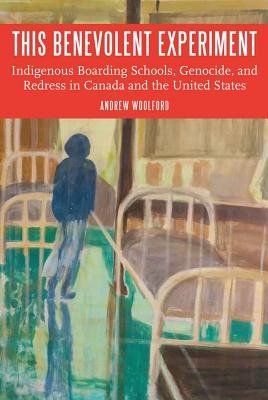
- We will send in 10–14 business days.
- Author: Andrew Woolford
- Publisher: University of Nebraska Press
- ISBN-10: 0803276729
- ISBN-13: 9780803276727
- Format: 15.2 x 22.9 x 2.9 cm, kieti viršeliai
- Language: English
- SAVE -10% with code: EXTRA
Reviews
Description
At the end of the nineteenth century, Indigenous boarding schools were touted as the means for solving the "Indian problem" in both the United States and Canada. With the goal of permanently transforming Indigenous young people into Europeanized colonial subjects, the schools were ultimately a means for eliminating Indigenous communities as obstacles to land acquisition, resource extraction, and nation-building. Andrew Woolford analyzes the formulation of the "Indian problem" as a policy concern in the United States and Canada and examines how the "solution" of Indigenous boarding schools was implemented in Manitoba and New Mexico through complex chains that included multiple government offices with a variety of staffs, Indigenous peoples, and even nonhuman actors such as poverty, disease, and space. The genocidal project inherent in these boarding schools, however, did not unfold in either nation without diversion, resistance, and unintended consequences. Inspired by the signing of the 2006 Residential School Settlement Agreement in Canada, which provided a truth and reconciliation commission and compensation for survivors of residential schools, This Benevolent Experiment offers a multilayered, comparative analysis of Indigenous boarding schools in the United States and Canada. Because of differing historical, political, and structural influences, the two countries have arrived at two very different responses to the harms caused by assimilative education. Andrew Woolford is a professor of sociology at the University of Manitoba and a recipient of the Fulbright Scholar award. He is the author of Between Justice and Certainty: Treaty-Making in British Columbia and the coeditor of Colonial Genocide in Indigenous North America.
EXTRA 10 % discount with code: EXTRA
The promotion ends in 22d.18:16:52
The discount code is valid when purchasing from 10 €. Discounts do not stack.
- Author: Andrew Woolford
- Publisher: University of Nebraska Press
- ISBN-10: 0803276729
- ISBN-13: 9780803276727
- Format: 15.2 x 22.9 x 2.9 cm, kieti viršeliai
- Language: English English
At the end of the nineteenth century, Indigenous boarding schools were touted as the means for solving the "Indian problem" in both the United States and Canada. With the goal of permanently transforming Indigenous young people into Europeanized colonial subjects, the schools were ultimately a means for eliminating Indigenous communities as obstacles to land acquisition, resource extraction, and nation-building. Andrew Woolford analyzes the formulation of the "Indian problem" as a policy concern in the United States and Canada and examines how the "solution" of Indigenous boarding schools was implemented in Manitoba and New Mexico through complex chains that included multiple government offices with a variety of staffs, Indigenous peoples, and even nonhuman actors such as poverty, disease, and space. The genocidal project inherent in these boarding schools, however, did not unfold in either nation without diversion, resistance, and unintended consequences. Inspired by the signing of the 2006 Residential School Settlement Agreement in Canada, which provided a truth and reconciliation commission and compensation for survivors of residential schools, This Benevolent Experiment offers a multilayered, comparative analysis of Indigenous boarding schools in the United States and Canada. Because of differing historical, political, and structural influences, the two countries have arrived at two very different responses to the harms caused by assimilative education. Andrew Woolford is a professor of sociology at the University of Manitoba and a recipient of the Fulbright Scholar award. He is the author of Between Justice and Certainty: Treaty-Making in British Columbia and the coeditor of Colonial Genocide in Indigenous North America.


Reviews